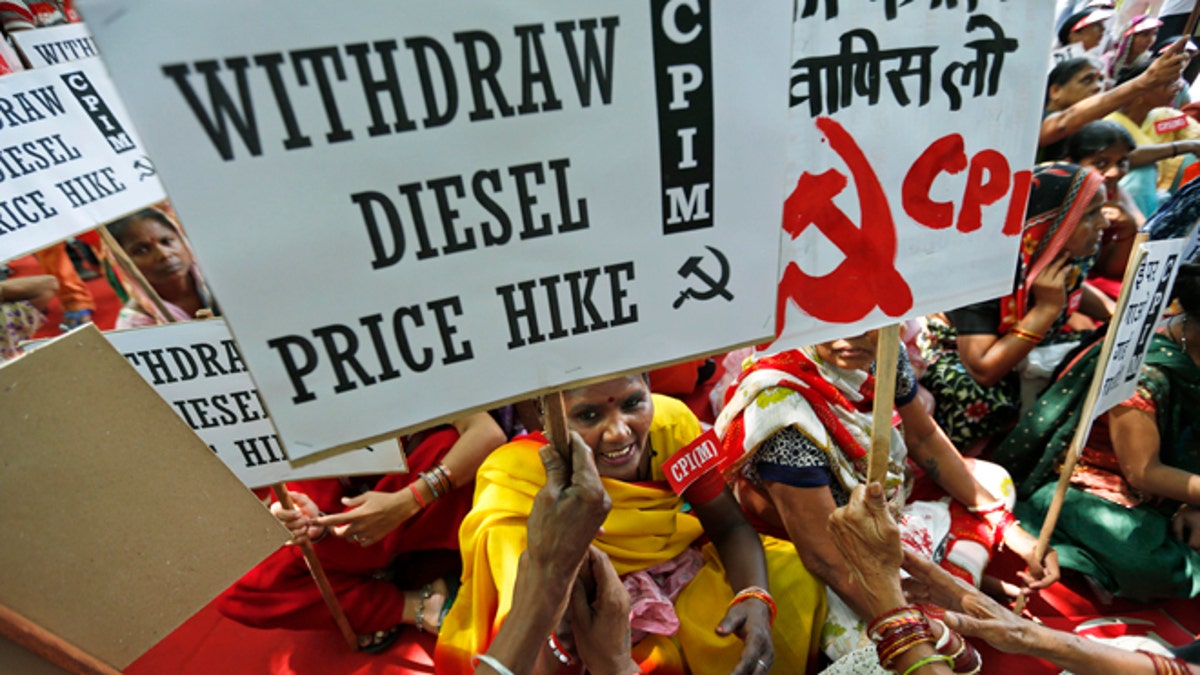
Sept. 20, 2012: Supporters of Communist Party of India (Marxist) participate in a protest with placards in New Delhi, India. (AP)
Parties opposed to a new economic proposal by the government of India called a general strike Thursday, disrupting road and rail traffic in many parts of the country. However, the financial capital Mumbai was largely untouched, and the capital New Delhi was only partially shut down. It was most dramatic in states that are supportive of the opposition.
There are two flashpoint issues here. The first is a hike in diesel fuel prices, because diesel is highly subsidized in India. As most goods in India are trucked from point to point, this could result in increases in the prices of food and other commodities.
The second issue is an economic reform that will allow big box stores like Walmart and several European chain stores to open branches in India. Until now, such foreign multibrand retail operations have been banned. There may be restaurant chains like McDonald's and international fashion labels in India but not multibrand foreign retail.
This new legislation changes all that. With 150 million people described as middle class in India, there is a big market for the Walmarts of the world to tap.
But the owners of “mom and pop” grocery stores in many parts of India are up in arms, fearing this will mark their end.
Sources on the ground in India tell Fox News that India needs efficient, Western-style retail shops, as many of the smaller ones are unregulated.
The Confederation for Indian Industries says the country lost $2.25 billion in trade Thursday due to the strike. Other estimates are slightly higher.
“The controversy over allowing foreign direct investment is largely political," Shiv Aroor, deputy editor of Indian network Headlines Today, told Fox News. "While there are legitimate concerns about the manner in which FDI will flow into the country and the benefits that will accrue, there is little real debate about the fact that the Indian economy needs to open up more, rather than continue to protect certain sectors. Walmart, inevitably, has become the sort of demonized face of the current political turbulence over FDI.”
Certain cabinet members are threatening to quit the coalition government in protest of the new legislation, which the government has tried in the past to put through.
But Salman Khurshid India’s Minister of Law, tells Fox News, “We didn’t want alliance partners to break off, but we realized we had to take a hard decision, and we are taking a hard decision.”
India, which had been experiencing annual growth of at least 8 percent has seen that number drop to 6 percent. Proponents of the new legislation believe an injection of foreign investment and giving the consumer more choice will help push the economy forward.
U.S. economic relations with India are strong, with some analysts saying America wants a strong India to counter China.
In the meantime, the trend of outsourcing American jobs has benefited India. The highest number of those jobs go to India. According to the Economic Policy Institute, American companies created more jobs overseas this year than they did in the United States.
Wal Mart welcomes the chance to do more business in India. The company already is involved in a joint venture with an Indian company but not under the company's name, and the business is only wholesale.
The new law will still require a joint-venture structure, but companies like Wal Mart will be able to actually have a majority stake and do retail.
Wal Mart India issued the following statement: “We are grateful that the government has realized and appreciated the value that we will bring to strengthen the Indian economy. This policy change will allow us to connect directly with the consumer and save them money. By being ‘stores of the community,’ we will also help them live better. “
However, individual states can decide to block stores like Walmart from coming to town. And Aroor, the Headlines Today editor said, “Considering how controversial FDI in retail already is, it is unlikely that multi-brand retailers will have a free hand in the country anytime soon.”








































